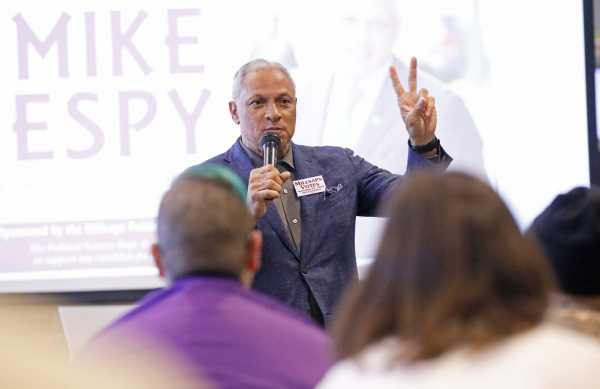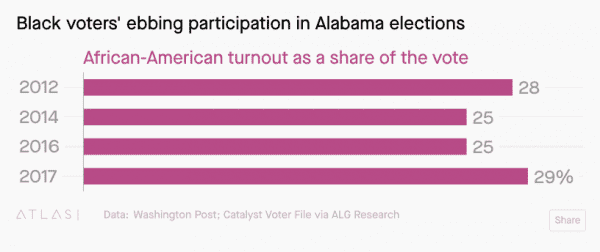
Democrat Mike Espy would the first black senator from Mississippi since Reconstruction if he wins a long-shot bid on Tuesday in the Mississippi Senate runoff election.
Espy has never led Sen. Cindy Hyde-Smith in the polls. But I spoke recently with a half-dozen political insiders tracking the race — Democrats, Republicans, and unaffiliated — and everybody agreed that he could win.
The question is how. Donald Trump won Mississippi by 18 points in 2016. Republican Sen. Roger Wicker, the state’s senior senator, just won reelection by nearly 20 points earlier this month. Mississippi hasn’t elected a Democrat to the Senate since the 1980s — back when some southern Democrats were still unapologetic segregationists.
So it’s a long shot. But based on my conversations, Espy’s best shot at an upset requires three things:
The difficulty of the task should not be underestimated. Even after Hyde-Smith drew national media attention for a joke she told about “public hangings” and her attendance at a white segregation school. Republicans are spending a lot of money to link Espy, an ex-Congress member and agriculture secretary under President Bill Clinton, to his past with the Clintons and a 30-count corruption indictment in the 1990s (he ended up acquitted on all charges).
Oddly enough, nobody expects the Hyde-Smith controversies that have visited national attention on Mississippi to make or break the race. If the Democrat is to pull off the unlikely win, this is how he would do it.
1) Espy needs black voters to turn out in strong numbers
Hyde-Smith and Espy are vying to finish retired Sen. Thad Cochran’s current term, which ends in 2020. They were the top two finishers on November 6 in Mississippi’s so-called “jungle primary”; Hyde-Smith got 42 percent, Espy earned 40 percent, and Chris McDaniel, a former state legislator with white nationalist sympathies, received 17 percent.
Because no candidate got 50 percent, the two candidates receiving the most votes — Espy and Hyde-Smith — now square off in the November 27 special election. Winner takes all.
The numbers are straightforward, according to the Democratic operatives I spoke with: roughly 35 percent of Mississippi’s population is black, and Democrats need them to make up at least that much of the electorate — preferably more, of course — to have a chance.
It’s not a perfect comparison, but Alabama — the site of Democratic Sen. Doug Jones’s stunning win over Roy Moore last year — is one reason for hope. After dropping off in 2014 and 2016, black voters turned out in the highest numbers this decade to help push Jones to victory. They were a slightly bigger share of the electorate than the broader population: 29 percent versus 27 percent.

This is one place where Hyde-Smith’s associations with segregationists and Confederacy apologists could help. The stakes are going to be clear to the Democratic base: They have a chance to elect a black senator who is running against a politician who would even think to joke about lynchings. Nearly 600 people were lynched from Reconstruction to the 1960s, the highest number in the country, according to the NAACP.
2) If far-right voters stay home, that’s good for Espy
If you just looked at the top of the November 6 results, you would see a close race: Hyde-Smith 42 percent, Mike Espy 40 percent.
But the X-factor is the 17 percent of Mississippi voters who backed conservative Chris McDaniel, a former state lawmaker who very nearly toppled Cochran in a 2014 primary challenge and who has a long history of racially charged comments and associations with white supremacists.
McDaniel’s relatively meager showing was the end of a long fight between him and the Republican establishment in the state. He came within a percentage point of knocking off Cochran, a Mississippi politics legend, in 2014. But that left a bad taste in the mouths of many high-ranking Mississippi Republicans — including Gov. Phil Bryant, who more or less laughed off McDaniel’s pleas to be appointed Cochran’s replacement and went with Hyde-Smith instead.
For now, McDaniel’s political career is near an end. But his voters are important — the November 6 results show it. Whether or not they show up and vote for the Republican is the difference between a close race Espy could maybe win and a Hyde-Smith blowout.
“What if McDaniel voters don’t show up?” Dallas Breen, executive director of the John C. Stennis Institute of Government at Mississippi State University, says that’s the biggest outstanding question heading into the runoff. “If they don’t show up, we almost had a 41-41 split between the two candidates.”
One post-jungle primary poll did show Hyde-Smith pulling 100 percent of McDaniel voters. That’s not really a surprise; it’d be much more shocking if voters who backed somebody with McDaniel’s views on race crossed party lines and voted for a Democrat. The question is whether they actually turn out.
3) Espy needs to win some white independents and moderate Republicans
Espy must also pick up a respectable (for Mississippi) number of white voters: I was told somewhere north of 20 percent. In 2014, the last midterm election, white voters in the Deep South broke for the GOP 81 percent to 17 percent. So it’s a small number, but a heavy lift.
The targets for the Espy campaign are moderate and business-minded Republicans and independents who might be turned off by Hyde-Smith’s embrace of President Trump and news stories associating her with the Confederacy and segregation.
Espy is courting those voters. He is a bit of a deficit hawk, for a Democrat, and says he probably would have voted for the GOP tax law. On regulations, “I’m going to come down on the side of business,” he told the Clarion-Ledger this year.
He served in Congress from 1987 to 1993, before he left to become Clinton’s agriculture secretary, a stint that ended with Espy on trial for corruption, though he was acquitted on all charges. One recent ad, a closing argument of sorts, touts his bipartisan record, pointing out that the first bill he ever got passed through Congress was signed by Ronald Reagan.
Brandon Finnegan, who runs Decision Desk HQ, pointed to two counties — Harrison and Rankin — as good indicators of whether Espy is eroding the Republican advantage in these suburban areas. Rankin, just to east of the state capital of Jackson, voted for Donald Trump by 50 points over Hillary Clinton. Harrison, home to Biloxi and Gulfport, broke for Trump by 31 points.
A little headway in those counties would bode well for Espy. But they are also a potent reminder of how steep the climb will be for him. This is still, after all, Mississippi.
Sourse: vox.com






